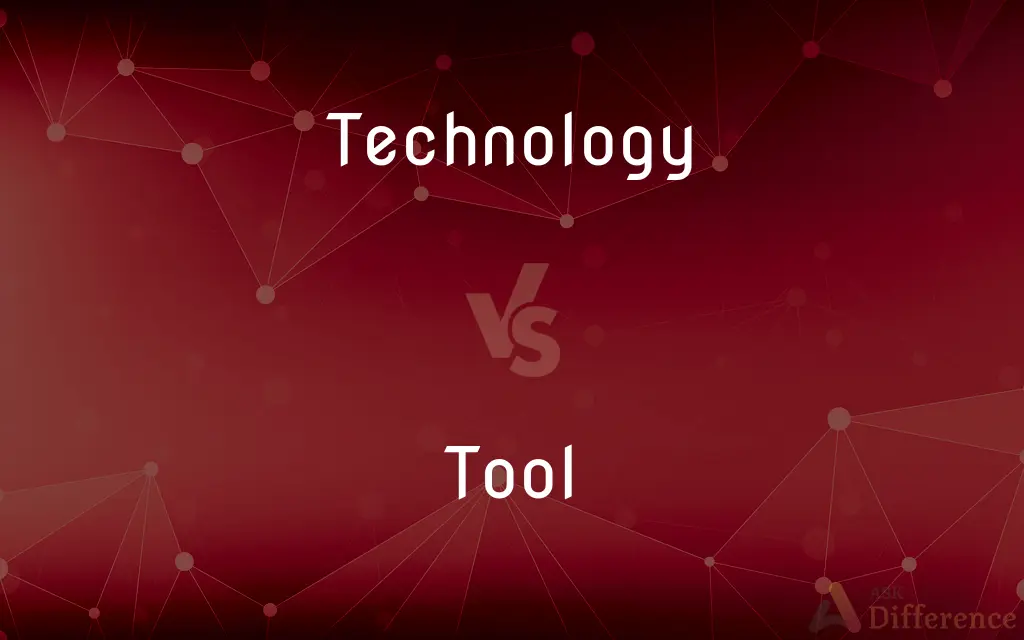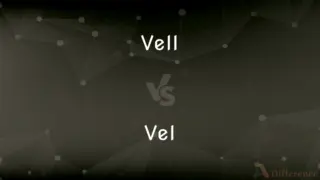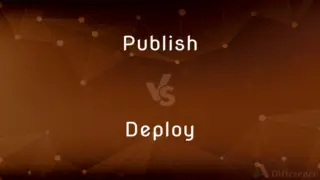Technology vs. Tool — What's the Difference?
By Urooj Arif & Fiza Rafique — Updated on March 1, 2024
Technology encompasses the application of scientific knowledge for practical purposes, often involving complex systems and processes, while a tool is a device or implement used to carry out a specific function, typically requiring human operation.

Difference Between Technology and Tool
Table of Contents
ADVERTISEMENT
Key Differences
Technology and tool are terms that intersect in the realm of practical application but differ significantly in scope and complexity. Technology is a broad concept that includes the tools, machinery, devices, systems, and processes used in the service of solving problems, enhancing capabilities, or making tasks easier. It is rooted in the application of scientific knowledge and can encompass everything from simple tools to complex information systems and sophisticated machinery. A tool, on the other hand, is more narrowly defined and specific in its application. It is an object or device designed to perform a particular function, often by manual operation. Tools can be as simple as a hammer or screwdriver, used to manipulate materials or components, or as complex as a software program designed for a specific computational task.
Technology's reach extends into various sectors, including communication, transportation, manufacturing, and healthcare, reflecting its role in advancing human progress and efficiency. While all tools can be considered a form of technology, especially when they embody a novel application of scientific principles, not all technology can be reduced to the term "tool."
The distinction often lies in the level of interaction and the complexity of the system. Tools typically require direct human manipulation or intervention to fulfill their purpose, serving as extensions of human capability in a tangible, often physical, form. Technology, in a broader sense, can operate with varying degrees of autonomy, from fully manual tools to completely automated systems, reflecting a wide spectrum of human ingenuity and innovation.
A tool is a subset of technology, focused on direct application and functionality, technology encompasses a wider array of applications, systems, and processes that can operate independently or require human intervention, driving forward the development and application of scientific knowledge.
Comparison Chart
Definition
The application of scientific knowledge for practical purposes.
A device or implement used to carry out a specific function.
ADVERTISEMENT
Scope
Broad, encompassing systems, processes, and devices.
Narrow, specific to devices or implements for particular tasks.
Complexity
Can range from simple tools to complex systems.
Generally simpler, designed for specific, often manual tasks.
Human Interaction
Varies from minimal to extensive, with some technologies operating autonomously.
Typically requires direct human operation or manipulation.
Examples
Computers, internet, automation systems, space stations.
Hammer, saw, software programs for specific tasks, paintbrush.
Purpose
Solve problems, enhance capabilities, improve efficiency.
Perform a particular function, often by modifying the environment or materials.
Autonomy
Can operate independently or with minimal human intervention.
Requires human intervention to fulfill its purpose.
Compare with Definitions
Technology
Encompasses both products and processes.
Solar panel technology harnesses the sun's energy for electricity.
Tool
A device used to perform a task.
A screwdriver is a tool used for turning screws.
Technology
Can be digital, mechanical, or chemical.
CRISPR technology allows for targeted modifications of genetic material.
Tool
Enhances human capability.
Telescopes are tools that extend our ability to see distant objects.
Technology
Involves innovation and development.
Blockchain technology offers new ways to secure and verify transactions.
Tool
Can be simple or complex.
A software development kit (SDK) is a complex tool for creating apps.
Technology
Aids in solving complex problems.
Water purification technology provides access to clean water in remote areas.
Tool
Often manual, but can be powered.
A power drill is a tool that simplifies making holes.
Technology
Broad application of knowledge for practical purposes.
The smartphone is a piece of technology that has transformed communication.
Tool
Specific to its function.
A paintbrush is a tool specifically designed for applying paint.
Technology
Technology ("science of craft", from Greek τέχνη, techne, "art, skill, cunning of hand"; and -λογία, -logia) is the sum of techniques, skills, methods, and processes used in the production of goods or services or in the accomplishment of objectives, such as scientific investigation. Technology can be the knowledge of techniques, processes, and the like, or it can be embedded in machines to allow for operation without detailed knowledge of their workings.
Tool
A tool is an object that can extend an individual's ability to modify features of the surrounding environment. Although many animals use simple tools, only human beings, whose use of stone tools dates back hundreds of millennia, have been observed using tools to make other tools.
Technology
The application of scientific knowledge for practical purposes, especially in industry
Advances in computer technology
Recycling technologies
Tool
A device or implement, especially one held in the hand, used to carry out a particular function
Gardening tools
Technology
The application of science, especially to industrial or commercial objectives.
Tool
A distinct design in the tooling of a book.
Technology
The scientific method and material used to achieve a commercial or industrial objective.
Tool
A device, such as a saw, shovel, or drill, used to perform or facilitate manual or mechanical work.
Technology
The practical application of science to commerce or industry
Tool
A machine, such as a lathe, used to cut and shape machine parts or other objects.
Technology
The discipline dealing with the art or science of applying scientific knowledge to practical problems;
He had trouble deciding which branch of engineering to study
Tool
An instrument such as a hammer, saw, plane, file, and the like, used in the manual arts, to facilitate mechanical operations; any instrument used by a craftsman or laborer at his work; an implement; as, the tools of a joiner, smith, shoe-maker, etc.; also, a cutter, chisel, or other part of an instrument or machine that dresses work.
Tool
Ride in a car with no particular goal and just for the pleasure of it;
We tooled down the street
Tool
Furnish with tools
Tool
Work with a tool
Common Curiosities
Can a simple object like a pencil be considered technology?
Yes, a pencil is a form of technology as it is a tool designed through the application of knowledge for writing.
Is a computer a tool or technology?
A computer is a form of technology that comprises numerous tools (hardware and software) to perform various tasks.
Are all modern inventions considered technology?
Yes, modern inventions that apply scientific knowledge for practical purposes are considered technology.
Can technology replace human skills?
While technology can automate certain tasks, it cannot replace the creativity, critical thinking, and emotional intelligence of humans.
Can technology exist without tools?
In practice, no. Tools are the physical embodiments or components of many technologies, essential for their application.
How do tools evolve into more complex technology?
Tools evolve into more complex technology through innovation, research, and integration with other technologies, increasing their capabilities and applications.
How does innovation affect tools and technology?
Innovation drives the development of new tools and technologies, enhancing capabilities and efficiency in solving problems.
How do tools and technology impact society?
They significantly impact society by improving quality of life, increasing efficiency, and enabling new forms of communication and interaction.
What role does human intervention play in technology and tools?
Human intervention is essential for the development and operation of tools and technology, though the degree of intervention varies.
Is the internet considered a tool or technology?
The internet is considered technology, comprising a vast network of tools and systems that facilitate global communication and information exchange.
Share Your Discovery

Previous Comparison
Vell vs. Vel
Next Comparison
Publish vs. DeployAuthor Spotlight
Written by
Urooj ArifUrooj is a skilled content writer at Ask Difference, known for her exceptional ability to simplify complex topics into engaging and informative content. With a passion for research and a flair for clear, concise writing, she consistently delivers articles that resonate with our diverse audience.
Co-written by
Fiza RafiqueFiza Rafique is a skilled content writer at AskDifference.com, where she meticulously refines and enhances written pieces. Drawing from her vast editorial expertise, Fiza ensures clarity, accuracy, and precision in every article. Passionate about language, she continually seeks to elevate the quality of content for readers worldwide.














































